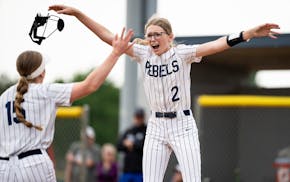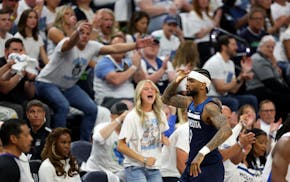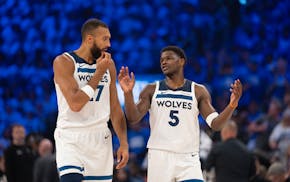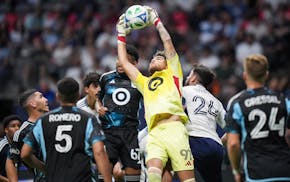The Timberwolves had so much going for them entering their second-round NBA playoff series against the Golden State Warriors.
The Warriors had just finished a grueling seven-game series against the Houston Rockets. The Wolves had home-court advantage and plenty of rest after finishing off the Los Angeles Lakers in five.
On top of that, the Warriors lost their best player, Stephen Curry, to a left hamstring strain in the second quarter of Game 1 on Tuesday night.
But having the odds in their favor is often the worst place for this Wolves team to be, and that proved again to be the case in a 99-88 loss before 19,223 at Target Center.
The Wolves turned in a head-scratching dud of a performance given the stakes and given their inherent advantages, especially after Curry went out.
Their offense had "poor spacing, terrible rhythm," and their decision-making in transition offense was "diabolical," as coach Chris Finch said afterward.
With Curry out, the main perimeter threat for the Warriors was Buddy Hield, but the Wolves inexplicably let him get free for 22 of his game-high 24 points after Curry exited with 8:10 to play in the second quarter.
The Wolves fell behind as much as 23 and never got closer than nine in the second half. Their three-point shooting troubles carried over from the end of the Lakers series. After going 4-for-47 in Game 5 in Los Angeles, the Wolves went 5-for-29 in Game 1, with Naz Reid (19 points) accounting for three of those makes.
"I don't know, man. You know when you lose a game, it's always somebody got this, somebody got that. This the reason that you lost. I don't really look at all that," guard Anthony Edwards said. "I just look at every last one of us gotta play better individually, including myself, and we'll see how it go.
"You can't blame. … It's a game, man. You just gotta play better individually and see what it do for us."
Finch said Edwards, especially, has to be better when it comes to igniting his team, especially at the start of the game. The Wolves fell behind early, and Edwards struggled to score. He had just one of his 23 points in the first half. That energy infected the rest of the team, Finch said.
"I absolutely saw that. We can't have that. It starts with Ant," Finch said. "He struggled, and then you could just kind of see the light go out a little bit for a while. Obviously, we had to try to get him going in the second half.
"I think it was one of those games where he kind of came out with a predetermined mindset of what he was trying to do rather than just play the game that was in front of him."
Edwards said he believed he came out with enough energy and that he just didn't get shots to drop.
When asked whether that was something he and Edwards would discuss ahead of Game 2, Finch said: "What is there to talk about? You're the leader of the team. You've got to come out and set the tone. If your shot is not going, you still have to carry the energy. If I've got to talk to guys about having the right energy coming into an opening second-round game, then we're not on the same page."
Despite that, the Wolves didn't have the right energy. In spots, it seemed as if they didn't have enough, then at other times, they might have had too much, as point guard Mike Conley suggested.
"It was almost too juiced up," Conley said. "It felt like guys were moving too fast. They were throwing the ball too hard or had too much energy, put too much into the game, too much juice, almost. And we wore ourselves out with the adrenaline."
That likely carried over into the poor shooting numbers. According to ESPN Stats and Information, the Wolves have recorded the worst two-game three-point shooting in playoff history at 15.7%. Edwards said he could tell that misses were affecting his teammates' willingness to shoot.
"Probably got a little gun shy, a little bit," said Edwards, who was 1-for-5 from deep. "You start missing a little bit, you get a little tight. I just be telling my teammates, shoot it, because they pack the paint. That's what they do."
The Warriors did that to great effect. Edwards was just 9-for-22 from the field, and Julius Randle (18 points) was 4-for-11 and had just three rebounds, a number with which he wasn't happy after the game.
"I can't have three rebounds," Randle said. "We all got to play better. I got to play better as an individual. I can't come away from this game playing 30 minutes and have three rebounds, so I got to play better."
Randle, Edwards and Reid weren't sounding the alarm bells in their postgame presser. Part of that might be because of Curry's uncertain status. Warriors coach Steve Kerr said Curry would have an MRI exam Wednesday and the team would plan as if it wouldn't have him available for Game 2 on Thursday.
It would be an obvious advantage for the Wolves the rest of the series if Curry were to miss a game or more. But having the advantage is the ultimate disadvantage sometimes for the Wolves, and they proved that again Tuesday.
"We respect these guys," said Rudy Gobert, who had nine points and 11 rebounds. "But I think subconsciously there is something where maybe you get a little comfortable. And it's not supposed to get easier. It's getting harder."

Champlin Park shuts out Rogers 1-0 to win Class 4A, Section 5 softball title

Twins affiliate rained out more than any team: 'Never seen anything like this'

Three key Timberwolves players could enter free agent market

Souhan: If Edwards is a franchise player, he needs to act and play like it

